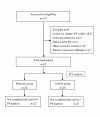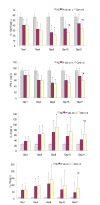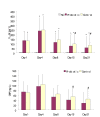Effects of probiotics on serum levels of Th1/Th2 cytokine and clinical outcomes in severe traumatic brain-injured patients: a prospective randomized pilot study
- PMID: 22136422
- PMCID: PMC3388628
- DOI: 10.1186/cc10579
Effects of probiotics on serum levels of Th1/Th2 cytokine and clinical outcomes in severe traumatic brain-injured patients: a prospective randomized pilot study
Abstract
Introduction: Traumatic brain injury (TBI) is associated with a profound immunological dysfunction manifested by a severe shift from T-helper type 1 (Th1) to T-helper type 2 (Th2) response. This predisposes patients to infections, sepsis, and adverse outcomes. Probiotic bacteria have been shown to balance the Th1/Th2 cytokines in allergic murine models and patients. For the present study, we hypothesized that the enteral administration of probiotics would adjust the Th1/Th2 imbalance and improve clinical outcomes in TBI patients.
Methods: We designed a prospective, randomized, single-blind study. Patients with severe TBI and Glasgow Coma Scale scores between 5 and 8 were included, resulting in 26 patients in the control group and 26 patients in the probiotic group. All patients received enteral nutrition via a nasogastric tube within 24 to 48 hours following admission. In addition, the probiotic group received 109 bacteria of viable probiotics per day for 21 days. The associated serum levels of Th1/Th2 cytokines, Acute Physiology and Chronic Health Evaluation (APACHE) II and Sequential Organ Failure Assessment (SOFA) scores, nosocomial infections, length of ICU stay, and 28-day mortality rate were studied.
Results: The patients responded to viable probiotics, and showed a significantly higher increase in serum IL-12p70 and IFNγ levels while also experiencing a dramatic decrease in IL-4 and IL-10 concentrations. APACHE II and SOFA scores were not significantly affected by probiotic treatment. Patients in the probiotic group experienced a decreased incidence of nosocomial infections towards the end of the study. Shorter ICU stays were also observed among patients treated with probiotic therapy. However, the 28-day mortality rate was unaffected.
Conclusions: The present study showed that daily prophylactic administration of probiotics could attenuate the deviated Th1/Th2 response induced by severe TBI, and could result in a decreased nosocomial infection rate, especially in the late period.
Trial registration: ChiCTR-TRC-10000835.
Figures



Comment in
-
Probiotics for severe trauma patients.Crit Care. 2011;15(6):1022. doi: 10.1186/cc10589. Epub 2011 Dec 29. Crit Care. 2011. PMID: 22226151 Free PMC article.
References
-
- Meisel C, Schwab JM, Prass K, Meisel A, Dirnagl U. Central nervous system injury-induced immune deficiency syndrome. Nat Rev Neurosci. 2005;6:775–786. - PubMed
Publication types
MeSH terms
Substances
LinkOut - more resources
Full Text Sources
Other Literature Sources

